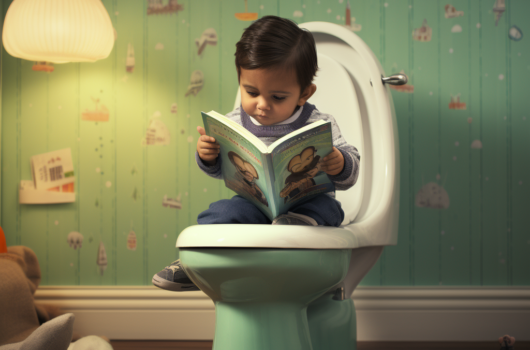Potty training can be a challenging and frustrating process for both parents and toddlers. However, with the right techniques and strategies, it is possible to successfully navigate this milestone in your child’s development. In this comprehensive guide, we will explore proven techniques that will help you win the battle of potty training your determined toddler.
- Understanding the Potty Training Process: A Guide for Parents
- Setting the Stage: Creating a Positive Environment for Potty Training Success
- Patience and Consistency: Key Factors in Successfully Potty Training Your Toddler
- Effective Communication Strategies: Encouraging your Determined Toddler to Use the Potty
- Reward Systems and Motivation Techniques: Making Potty Training Fun and Exciting
- Overcoming Challenges: Troubleshooting Common Issues during the Potty Training Journey
Understanding the Potty Training Process: A Guide for Parents
Before diving into the practical aspects of potty training, it is essential to understand the process itself. Every child develops at their own pace, so it’s important not to compare your toddler’s progress with others. On average, most children are ready for potty training between 18 months and 3 years old.
The first step in understanding the potty training process is recognizing signs of readiness in your child. These signs include showing an interest in using the toilet or wearing underwear, staying dry for longer periods during naps or overnight sleep, expressing discomfort when wearing a wet or dirty diaper, and being able to follow simple instructions.
Once you have identified these signs of readiness in your toddler, it’s time to set the stage for success.
Setting the Stage: Creating a Positive Environment for Potty Training Success
Creating a positive environment plays a crucial role in successful potty training. Start by introducing your toddler to their new “potty area.” This could be a small chair or seat specifically designed for them. Make sure it is easily accessible and placed somewhere convenient within reach.
Additionally, involve your child in choosing their own special underwear as part of creating excitement around using the toilet like grown-ups do! Decorate their bathroom space with colorful stickers or posters related to potties; this will make them feel more comfortable about transitioning from diapers.
Furthermore, establish routines that revolve around toileting activities such as sitting on their designated potty after meals or before bedtime. Consistency is key in creating a positive environment for potty training success.
Patience and Consistency: Key Factors in Successfully Potty Training Your Toddler
Potty training requires patience and consistency from parents. It’s important to remember that accidents will happen, and setbacks are normal during this process. Stay calm and supportive when accidents occur, as scolding or punishing your child can create negative associations with using the toilet.
Consistency is crucial in reinforcing new habits. Set regular intervals for taking your toddler to the potty throughout the day, even if they don’t show any signs of needing to go. This helps them establish a routine and become familiar with the sensation of needing to use the bathroom.
Another effective technique is using timers or alarms as reminders for both you and your child. By setting specific times every few hours, you can prompt your toddler to try using the potty regularly without relying solely on their own awareness.
Effective Communication Strategies: Encouraging your Determined Toddler to Use the Potty
Communication plays a vital role in encouraging toddlers during their potty training journey. Start by explaining what it means to use the toilet like grown-ups do, using simple language that they can understand.
Encourage open communication by asking questions such as “Do you need to go potty?” or “Would you like me to help you sit on your special chair?” This allows them to express their needs while also feeling supported throughout this learning process.
Additionally, praise and positive reinforcement are powerful tools when it comes to motivating toddlers during potty training. Celebrate small victories such as sitting on the potty chair or successfully urinating/defecating in it by offering verbal praise, high-fives, stickers, or small rewards like a favorite snack.
Reward Systems and Motivation Techniques: Making Potty Training Fun and Exciting
Implementing reward systems can make potty training more enjoyable for your determined toddler. Consider creating a sticker chart or using a jar filled with small treats as incentives for successful potty trips.
For example, every time your child successfully uses the potty, they can earn a sticker to place on their chart. Once they accumulate a certain number of stickers, they can choose a special reward like going to the park or having extra playtime.
Another effective motivation technique is using books or videos that focus on potty training. These resources not only provide entertainment but also serve as educational tools that reinforce positive behaviors and normalize the process of using the toilet.
Overcoming Challenges: Troubleshooting Common Issues during the Potty Training Journey
Despite our best efforts, challenges may arise during the potty training journey. One common issue is resistance from toddlers who are reluctant to use the toilet. In such cases, it’s important to remain patient and understanding while gently encouraging them without forcing or pressuring them into compliance.
If accidents become frequent, consider adjusting your approach by increasing reminders and reducing distractions in their environment. Additionally, ensure that your child has easy access to their designated potty area at all times.
Bedwetting can also be an obstacle during nighttime training. To address this issue, limit fluid intake before bedtime and encourage your child to empty their bladder right before sleep. Using waterproof mattress protectors can help minimize stress associated with accidents while providing comfort for both you and your toddler.
Potty training is undoubtedly challenging but achievable with patience, consistency, effective communication strategies, motivation techniques through rewards systems and overcoming common issues along the way. By understanding the process itself and setting up a positive environment for success while maintaining open lines of communication with your determined toddler throughout this journey will ultimately lead you towards victory in winning this battle!
